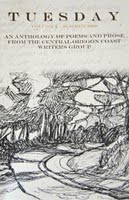Like, totally, whatever, you know?
Today's entertainment courtesy of Taylor Mali.
 Wednesday, October 21, 2009 at 1:57PM
Wednesday, October 21, 2009 at 1:57PM  Post a Comment |
Post a Comment | Today's entertainment courtesy of Taylor Mali.
From cocktail parties to client meetings, the question is inevitable: What do you do? followed by, What do you write?
I always fumble for an answer. Am I a journalist? a freelance writer? publicist? poet? instructor?
I am all of these, in succession and all at once. But “I’m a writer/marketing professional/instructor . . . ” is an unwieldy response that is returned with wrinkles of doubt and a swift walk away from the babbling woman who lacks a sense of self.
I am a former newspaper reporter and editor, and I run a marketing communications firm that promotes businesses and organizations. I am a poet, published in journals and books. I work with youth, leading writing groups and classes. I am an occasional travel writer. I write ad copy for agencies. To add to the confusion, the other evening I was introduced as a blogger.
It gets too much to explain. This writer’s role is full and assorted. Most writers-for-hire (which sounds crass and commercial but does make a point) juggle a variety of clients, topics and titles.
So what do you call the writer who has not written a best-selling novel (and has no such plans) but still uses words to explain, ignite, assist and inspire?
At WordCount, Michelle Rafter proposes the end of “freelance writer” in favor of “journalist entrepreneur.” She’s got a point and has sparked a spirited conversation.
Meanwhile, I’m still sorting myself out. As a communicator seeking definition, I am my most difficult assignment.
To shift the structure of a sentence alters the meaning of that sentence, as definitely and inflexibly as the position of a camera alters the meaning of the object photographed...The arrangement of the words matters, and the arrangement you want can be found in the picture in your mind...The picture tells you how to arrange the words and the arrangement of the words tells you, or tells me, what's going on in the picture.
— Joan Didion, from Why I Write (New York Times, 1976)
My neighbor is the poet laureate of her church, St. Luke’s By the Sea Episcopal Church. Just the name makes me smile. By the sea. How idyllic. Indeed, it is a small and unassuming church situated along the road traversing the Pacific Ocean. I love that poetry is part of the program. Poetry as spiritual practice in which all art is holy, in which holy means reverent, means concentrated appreciation, means meditation on life. While my neighbor-friend is not a poet, she has a fierce appreciation for poetry. Together, she and the priest choose works for each service. They aren’t necessarily religious poems, she notes, but offer a range of cultures and perspectives, from Sufi poet Hafiz to nature-focused Mary Oliver. After the service, the congregation is hearty with praise. “The best part,” she says, “is that people really appreciate the poems, people who may not read poetry on their own.” And maybe, without knowing, they are thankful for the gift of prayer delivered in a poem.




Whatcha reading? I've been in a book frenzy, poring through a mix of fiction, mystery and poetry. It's a scattered but satisfying book list.